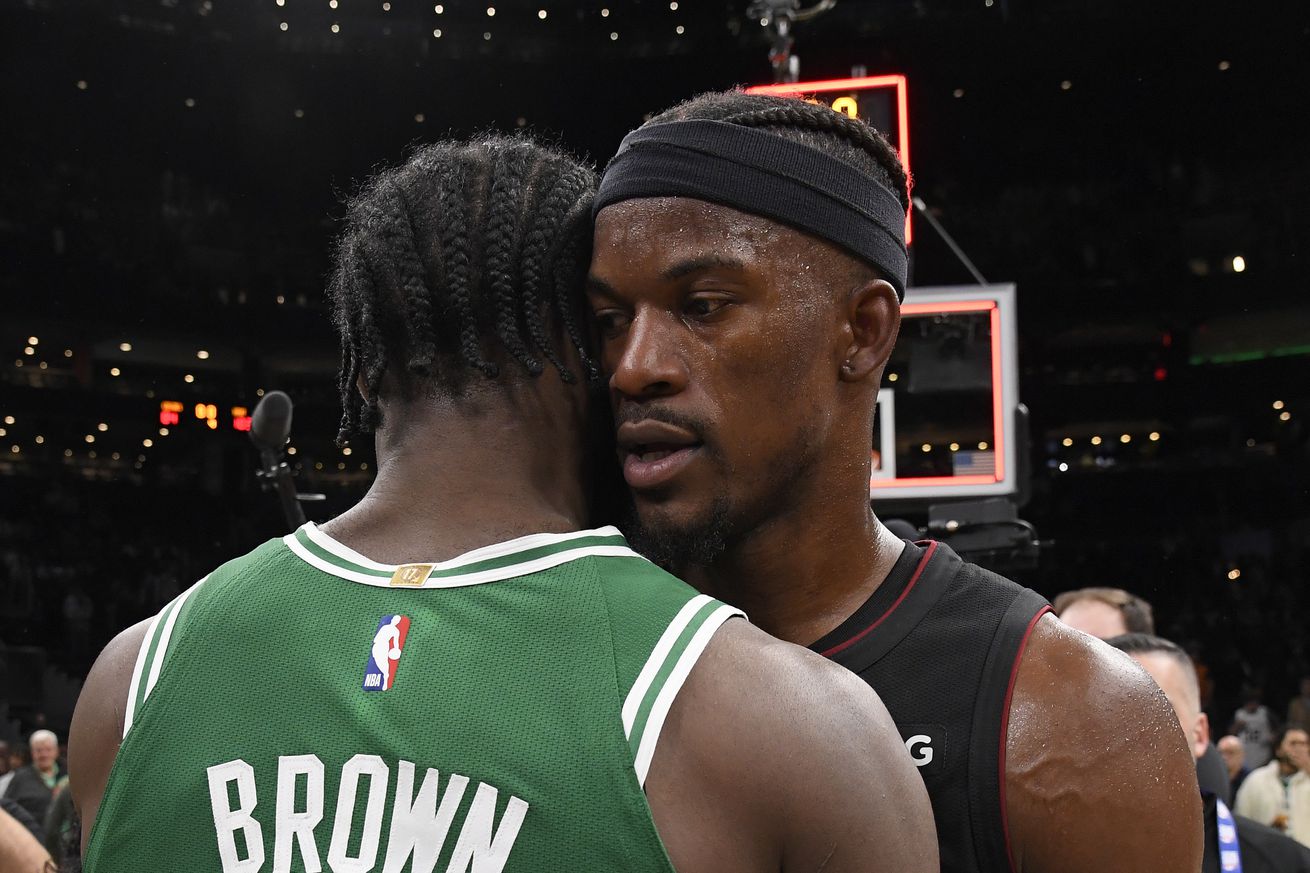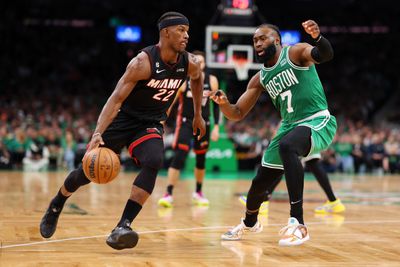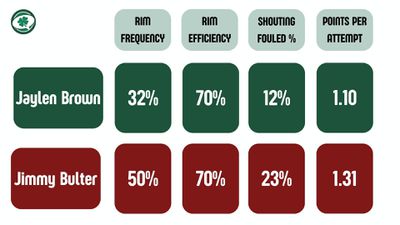
Exploring whether trading for Jimmy Butler could address the Celtics’ present weaknesses on the court while navigating financial complexities and roster decisions down the road. Could this be the bold move Boston eventually needs to make?
This thought experiment explores the hypothetical scenario of a Jimmy Butler trade, analyzing its potential on-court benefits, financial ramifications, and what it could signal for the Celtics’ future decision-making.
Jimmy Butler to the Celtics could have happened before — twice, actually.
First, back at his draft in 2011, then President of Basketball Operations Danny Ainge was close to selecting him but ended up with JaJuan Johnson after a trade with the Nets. A few years later, Ainge could have traded for Jimmy Butler using the draft picks that turned into Jaylen Brown and Jayson Tatum. And yet, Jimmy Butler to the Celtics never happened… so far.
As you might have heard, Jimmy Butler has reportedly asked to be traded out of Miami, seeking a place to compete for a title. And what better place for that than the Boston Celtics? From his perspective, this might look like the perfect opportunity.
You might be wondering—how and more importantly why could the Celtics trade for Butler, and whether it makes sense to take a gamble on the 35-year-old forward. Well, walk with me into this parallel universe (that could be a not too far reality).

Photo by Maddie Meyer/Getty Images
The how
The Celtics are in the second apron, so they cannot send multiple players in a trade to match salaries and take on additional salary beyond what’s already on their books. This would likely mean a straightforward swap between Jaylen Brown and Jimmy Butler, potentially with draft picks involved, possibly going from the Heat to the Celtics. As we speak, the Heat have only two picks to send (2030 and 2031 first round) but they could move things around to build a better offer.
Why it might make sense on the court
What are the Celtics struggling with this season?
- Generating free throws (21st in the league)
- Getting to the rim (28th in the league)
- Forcing turnovers (23rd in the league)
- Creating transition opportunities (25th in the league)
What is Jimmy Butler good at? Well, all of the above.
Offensively, he is hard to stop from getting to the rim. This year, half of his shot attempts have come at the rim, where he converts at a 70% rate—despite Miami’s average spacing. Imagine the damage Butler could do with the elite spacing provided by the Celtics.
He’s also an absolute menace when it comes to drawing fouls. He generates shooting fouls on 23% of his attempts—better than Joel Embiid or Giannis Antetokounmpo. This alone could boost the Celtics’ offense significantly when their outside shots aren’t falling. For context, Butler averages 1.31 points per shot attempt, compared to 1.10 for Jaylen Brown.

Defensively, the Celtics have struggled to create turnovers and transition opportunities. Jimmy Butler’s elite anticipation and ability to disrupt passing lanes would be a significant boost. Historically, he has excelled at pressuring ball handlers and forcing steals.
In transition, while the Celtics would miss Jaylen Brown’s finishing ability, Butler’s playmaking would compensate. Mathematically, based on on-court impact, Butler could help transform many of the Celtics’ current weaknesses into strengths.
However, the Celtics would be missing Jaylen Brown point-of-attack defense. This trade would improve the off-ball defense and should lead to more transition, but the Celtics will be out of their go-to-guy to stop the opponents superstar. Would Jimmy Butler be able to slow down Luka Doncic as much as Jaylen Brown did during the last NBA Finals? I doubt it.
However, Jrue Holiday or Jayson Tatum could take over the superstar assignment, while Jimmy Butler would remain off-ball, ready to jump on passes.
As for concerns about fit, Butler has a smaller usage rate than Brown, and his driving and post-up game would thrive within the Celtics’ spacing. He wouldn’t clog their offense or disrupt the flow.
And let’s not forget Jaylen Brown’s comment that the Celtics “hunt seals” on offense. Jimmy Butler is an elite hunter.
Why it might make financial sense
The Celtics’ financial situation is complex. They are in the second apron and are projected to remain there next season. Beyond the usual penalties, staying in the second apron for three years within a five-year span has significant consequences: “if teams remain in the second apron for any three years in a five-year period, their upcoming first-round draft pick is automatically moved to the end of the first round.”
The Celtics currently have five players earning over $30 million annually for the next two years. Moving Jrue Holiday’s contract would be difficult, Derrick White’s deal is too valuable to trade, and Kristaps Porziņģis provides crucial spacing and rim protection—plus his recent injury diminishes his trade value. At some point, the Celtics may face a choice between their two franchise stars.

Trading for Jimmy Butler could be an early (and possibly premature) way out. While Butler’s player option looms, his expiring contract could provide the Celtics with financial flexibility in the near future—all while keeping them in contention.
However, what will happen to Jimmy Butler’s next contract? Will he want out of the Celtics? Will he ask too much — making it impossible for the Celtics to keep him happy? Jimmy Butler is already 35 years old, his best years are in the past, while Jaylen Brown peak is yet to come.
Will this gamble of Jimmy Butler bring the Celtics more finance flexibility — or will they be stuck in a more problematic situation, with a player that recently seemed impossible to keep happy.
What about the intangibles?
Forget the court and the finance for a second… how would the Celtics players and coaching staff react to such as tsunamis in the locker room? The Celtics current success has been build around Jaylen Brown and Jayson Tatum — would this even work with one of the Jay’s out?
On top of Jaylen’s departure, would the Celtics be able to integrate Jimmy Butler after such a monumental move? Jimmy has been an enemy for the last years. How could the Celtics front office trade for him against one of their brothers?
There are clear doubts that Jimmy Butler would fit well with a group that just saw its Finals MVP and longest-tenured player traded for him. And it’s doubtful that Brad Stevens would break apart the group he spent the offseason solidifying.
However, a potential Butler trade serves as a reminder that difficult decisions are on the horizon. Remember that, on top of the overloaded payroll, the Boston Celtics are currently for sale. With this trade, the current ownership could make the financial situation more appealing for potential buyers.
While such a earth-shattering deal may not make sense this season, it could be a template for what’s to come.